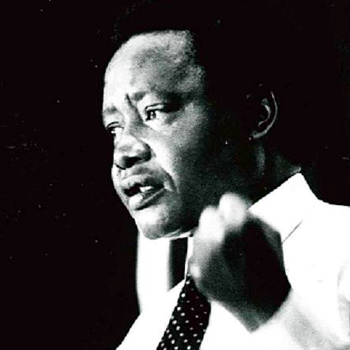One of South Africa’s most renowned newspaper editors, Percy Qoboza built The World into the country’s largest-circulation black daily and the voice of black South Africans during the apartheid era. Qoboza accomplished this task under an intolerable burden of legislation and ruthless, often racially based, harassment.
Qoboza was best known internationally for his criticism of the South African government in the aftermath of the 1976 Soweto uprising. He was frequently subjected to intimidation, interrogation and jailing, and his defiance under the apartheid regime became a symbol of resistance throughout the world.
Tselito Percy Peter Qoboza was born on January 17, 1938, in Sophiatown, Johannesburg. He began his journalistic career in 1963 at The World, a newspaper for black South Africans.
Qoboza was appointed news editor of The World in 1967 and editor-in-chief in 1974. Under his leadership, the daily spoke out on controversial issues and launched fierce attacks on the government and its policy of apartheid, which had as its stated aim the separate development of the country’s races through rigorous racial segregation.
In June 1976, violent riots occurred in Soweto, near Johannesburg, and rapidly spread to other black urban areas. Qoboza condemned the suppression of the demonstrations that followed, during which several hundred people died, and was arrested and detained for 18 hours without being charged.
The unrest culminated in September 1977 with the death in detention of the black community leader, Steve Biko. Qoboza condemned the murder in the pages of his paper. In a month, during a massive government crackdown on black opposition activities, both The World and the Weekend World were banned. Qoboza was again arrested without charge and freed after six months, in March 1978, following an international campaign for his release.
“The ‘End of the World’ has a special meaning for journalists in South Africa,” wrote Harvey Tyson, former editor-in-chief of the Johannesburg daily, The Star. “When the paper named The World was shut down by the government, press freedom finally died in this country.”
Qoboza remained in South Africa for three more years. He worked for the black weekly The Voice, which was later banned, and then as editor of the Transvaal editions of both the daily Post and the Sunday Post, which had taken over the role and much of the readership of the banned World.
Qoboza was seldom free from threats of violence that characterised the regime’s vindictiveness toward those who opposed apartheid. The pressures eventually proved too great, and Qoboza went to live in the United States.
Speaking at the IPI’s 29th annual General Assembly in Florence, Italy, in May 1980, Qoboza said: “One of the problems of South Africa is that we are a society obsessed by race. With shining consistency, South Africa has condemned journalists; they are all no good, irrespective of their colour. But because of colour, the black journalist is more susceptible to the pressures. … The government started very modestly by refusing black reporters passports. Then there were cases of journalists leaving on travel permits, often for training scholarships, never returning to their native land again.” But in the late 1970s, action against black journalists began to be stepped up. Qoboza said that he would never forget arriving at the office one day and finding nine reporters had disappeared, seemingly “wiped off the face of the earth.” Three were later released, but he never saw the other six again.
In the United States, Qoboza assumed the position of guest editor at the Washington Star, where he continued to be an outspoken critic of the apartheid regime as the editor in charge of Third World and UN affairs.
In 1985, Qoboza returned to South Africa, where the Post and Sunday Post had been closed in his absence, and began working as editor of the weekly City Press. Although owned by the pro-government Afrikaans press group, Nasionale Pers, he was allowed complete editorial independence and continued to criticise the apartheid regime in his hard-hitting column, “Percy’s Pitch.”
Under Qoboza’s editorship, City Press quickly became the country’s widest-read black-edited publication. Its circulation hit a peak of more than 200,000 shortly before Qoboza died, tragically, on his 50th birthday, after a short illness.
From Our Archive:
Address of Percy Qoboza to IPI’s 29th General Assembly in Florence, Italy, 1980.
“With shining consistency, South Africa has condemned journalists; they are all no good, irrespective of their colour. But because of colour, the black journalist is more susceptible to the pressures.”
Obituary, 1988.



